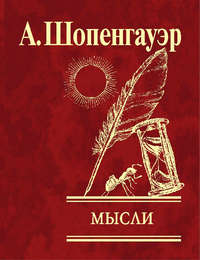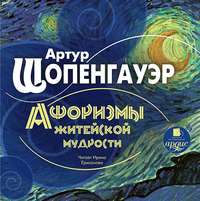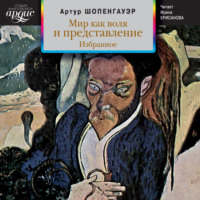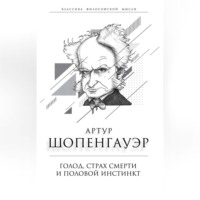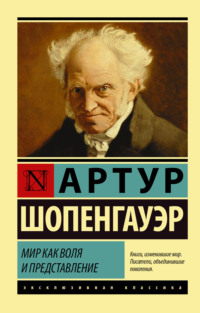 полная версия
полная версияThe World as Will and Idea (Vol. 3 of 3)
If, then, considerations of this kind are at any rate adapted to awaken the conviction that there is something in us which death cannot destroy, this yet only takes place by raising us to a point of view from which birth is not the beginning of our existence. But from this it follows that what is proved to be indestructible by death is not properly the individual, which, moreover, as having arisen through generation, and having in itself the qualities of the father and mother, presents itself as a mere difference of the species, but as such can only be finite. As, in accordance with this, the individual has no recollection of its existence before its birth, so it can have no remembrance of its present existence after death. But every one places his ego in consciousness; this seems to him therefore to be bound to individuality, with which, besides, everything disappears which is peculiar to him, as to this, and distinguishes him from others. His continued existence without individuality becomes to him therefore indistinguishable from the continuance of other beings, and he sees his ego sink. But whoever thus links his existence to the identity of consciousness, and therefore desires an endless existence after death for this, ought to reflect that he can certainly only attain this at the price of just as endless a past before birth. For since he has no remembrance of an existence before birth, thus his consciousness begins with birth, he must accept his birth as an origination of his existence out of nothing. But then he purchases the endless time of his existence after death for just as long a time before birth; thus the account balances without any profit for him. If, on the other hand, the existence which death leaves untouched is different from that of the individual consciousness, then it must be independent of birth, just as of death; and therefore, with regard to it, it must be equally true to say, “I will always be,” and “I have always been;” which then gives two infinities for one. But the great equivocation really lies in the word “I,” as any one will see at once who remembers the contents of our second book, and the separation which is made there of the willing from the knowing part of our nature. According as I understand this word I can say, “Death is my complete end;” or, “This my personal phenomenal existence is just as infinitely small a part of my true nature as I am of the world.” But the “I” is the dark point in consciousness, as on the retina the exact point at which the nerve of sight enters is blind, as the brain itself is entirely without sensation, the body of the sun is dark, and the eye sees all except itself. Our faculty of knowledge is directed entirely towards without, in accordance with the fact that it is the product of a brain function, which has arisen for the purpose of mere self-maintenance, thus of the search for nourishment and the capture of prey. Therefore every one knows himself only as this individual as it presents itself in external perception. If, on the other hand, he could bring to consciousness what he is besides and beyond this, then he would willingly give up his individuality, smile at the tenacity of his attachment to it, and say, “What is the loss of this individuality to me, who bear in myself the possibility of innumerable individualities?” He would see that even if a continued existence of his individuality does not lie before him, it is yet quite as good as if he had such an existence, because he carries in himself complete compensation for it. Besides, however, it may further be taken into consideration that the individuality of most men is so miserable and worthless that with it they truly lose nothing, and that that in them which may still have some worth is the universal human element; but to this imperishableness can be promised. Indeed, even the rigid unalterableness and essential limitation of every individual would, in the case of an endless duration of it, necessarily at last produce such great weariness by its monotony that only to be relieved of this one would prefer to become nothing. To desire that the individuality should be immortal really means to wish to perpetuate an error infinitely. For at bottom every individuality is really only a special error, a false step, something that had better not be; nay, something which it is the real end of life to bring us back from. This also finds confirmation in the fact that the great majority, indeed really all men, are so constituted that they could not be happy in whatever kind of world they might be placed. In proportion as such a world excluded want and hardship, they would become a prey to ennui, and in proportion as this was prevented, they would fall into want, misery, and suffering. Thus for a blessed condition of man it would be by no means sufficient that he should be transferred to a “better world,” but it would also be necessary that a complete change should take place in himself; that thus he should no longer be what he is, and, on the contrary, should become what he is not. But for this he must first of all cease to be what he is: this desideratum is, as a preliminary, supplied by death, the moral necessity of which can already be seen from this point of view. To be transferred to another world and to have his whole nature changed are, at bottom, one and the same. Upon this also ultimately rests that dependence of the objective upon the subjective which the idealism of our first book shows. Accordingly here lies the point at which the transcendent philosophy links itself on to ethics. If one considers this one will find that the awaking from the dream of life is only possible through the disappearance along with it of its whole ground-warp also, But this is its organ itself, the intellect together with its forms, with which the dream would spin itself out without end, so firmly is it incorporated with it. That which really dreamt this dream is yet different from it, and alone remains over. On the other hand, the fear that with death all will be over may be compared to the case of one who imagines in a dream that there are only dreams without a dreamer. But now, after an individual consciousness has once been ended by death, would it even be desirable that it should be kindled again in order to continue for ever? The greater part of its content, nay, generally its whole content, is nothing but a stream of small, earthly, paltry thoughts and endless cares. Let them, then, at last be stilled! Therefore with a true instinct, the ancients inscribed upon their gravestones: Securitati perpetuæ; – or Bonæ quieti. But if here, as so often has happened, a continued existence of the individual consciousness should be desired, in order to connect with it a future reward or punishment, what would really be aimed at in this would simply be the compatibility of virtue and egoism. But these two will never embrace: they are fundamentally opposed. On the other hand, the conviction is well founded, which the sight of noble conduct calls forth, that the spirit of love, which enjoins one man to spare his enemy, and another to protect at the risk of his life some one whom he has never seen before, can never pass away and become nothing.
The most thorough answer to the question as to the continued existence of the individual after death lies in Kant's great doctrine of the ideality of time, which just here shows itself specially fruitful and rich in consequences, for it substitutes a purely theoretical but well-proved insight for dogmas which upon one path as upon the other lead to the absurd, and thus settles at once the most exciting of all metaphysical questions. Beginning, ending, and continuing are conceptions which derive their significance simply and solely from time, and are therefore valid only under the presupposition of this. But time has no absolute existence; it is not the manner of being of the thing in itself, but merely the form of our knowledge of our existence and nature, and that of all things, which is just on this account very imperfect, and is limited to mere phenomena. Thus with reference to this knowledge alone do the conceptions of ceasing and continuing find application, not with reference to that which exhibits itself in these, the inner being of things in relation to which these conceptions have therefore no longer any meaning. For this shows itself also in the fact that an answer to the question which arises from those time-conceptions is impossible, and every assertion of such an answer, whether upon one side or the other, is open to convincing objections. One might indeed assert that our true being continues after death because it is false that it is destroyed; but one might just as well assert that it is destroyed because it is false that it continues: at bottom the one is as true as the other. Accordingly something like an antinomy might certainly be set up here. But it would rest upon mere negations. In it one would deny two contradictorily opposite predicates of the subject of the judgment, but only because the whole category of these predicates would be inapplicable to that subject. But if now one denies these two predicates, not together, but separately, it appears as if the contradictory opposite of the predicate which in each case is denied were proved of the subject of the judgment. This, however, depends upon the fact that here incommensurable quantities are compared, for the problem removes us to a scene where time is abolished, and yet asks about temporal properties which it is consequently equally false to attribute to, or to deny of the subject. This just means: the problem is transcendent. In this sense death remains a mystery.
On the other hand, adhering to that distinction between phenomenon and thing in itself, we can make the assertion that, as phenomenon, man is certainly perishable, but yet his true being will not be involved in this. Thus this true being is indestructible, although, on account of the elimination of time-conceptions which is connected with it, we cannot attribute to it continuance. Accordingly we would be led here to the conception of an indestructibility which would yet be no continuance. Now this is a conception which, having been obtained on the path of abstraction, can certainly also be thought in the abstract, but yet cannot be supported by any perception, and consequently cannot really become distinct; yet, on the other hand, we must here keep in mind that we have not, like Kant, absolutely given up the knowledge of the thing in itself, but know that it is to be sought for in the will. It is true that we have never asserted an absolute and exhaustive knowledge of the thing in itself, but rather have seen very well that it is impossible to know anything as it is absolutely and in itself. For as soon as I know, I have an idea; but this idea, just because it is my idea, cannot be identical with what is known, but repeats it in an entirely different form, for it makes a being for other out of a being for self, and is thus always to be regarded as a phenomenal appearance of the thing in itself. Therefore for a knowing consciousness, however it may be constituted, there can be always only phenomena. This is not entirely obviated even by the fact that it is my own nature which is known; for, since it falls within my knowing consciousness, it is already a reflex of my nature, something different from this itself, thus already in a certain degree phenomenon. So far, then, as I am a knowing being, I have even in my own nature really only a phenomenon; so far, on the other hand, as I am directly this nature itself, I am not a knowing being. For it is sufficiently proved in the second book that knowledge is only a secondary property of our being, and introduced by its animal nature. Strictly speaking, then, we know even our own will always merely as phenomenon, and not as it may be absolutely in and for itself. But in that second book, and also in my work upon the will in nature, it is fully explained and proved that if, in order to penetrate into the inner nature of things, leaving what is given merely indirectly and from without, we stick to the only phenomenon into the nature of which an immediate insight from within is attainable, we find in this quite definitely, as the ultimate kernel of reality, the will, in which therefore we recognise the thing in itself in so far as it has here no longer space, although it still has time, for its form consequently really only in its most immediate manifestation, and with the reservation that this knowledge of it is still not exhaustive and entirely adequate. Thus in this sense we retain here also the conception of will as that of the thing in itself.
The conception of ceasing to be is certainly applicable to man as a phenomenon in time, and empirical knowledge plainly presents death as the end of this temporal existence. The end of the person is just as real as was its beginning, and in the same sense as before birth we were not, after death we shall be no more. Yet no more can be destroyed by death than was produced by birth; thus not that through which birth first became possible. In this sense natus et denatus is a beautiful expression. But now the whole of empirical knowledge affords us merely phenomena; therefore only phenomena are involved in the temporal processes of coming into being and passing away, and not that which manifests itself in the phenomena, the thing in itself. For this the opposition of coming into being and passing away conditioned by the brain, does not exist at all, but has here lost meaning and significance. It thus remains untouched by the temporal end of a temporal phenomenon, and constantly retains that existence to which the conceptions of beginning, end, and continuance are not applicable. But the thing in itself, so far as we can follow it, is in every phenomenal being the will of this being: so also in man. Consciousness, on the other hand, consists in knowledge. But knowledge, as activity of the brain, and consequently as function of the organism, belongs, as has been sufficiently proved, to the mere phenomenon, and therefore ends with this. The will alone, whose work, or rather whose image was the body, is that which is indestructible. The sharp distinction of will from knowledge, together with the primacy of the former, which constitutes the fundamental characteristic of my philosophy, is therefore the only key to the contradiction which presents itself in so many ways, and arises ever anew in every consciousness, even the most crude, that death is our end, and that yet we must be eternal and indestructible, thus the sentimus, experimurque nos æternos esse of Spinoza. All philosophers have erred in this: they place the metaphysical, the indestructible, the eternal element in man in the intellect. It lies exclusively in the will, which is entirely different from the intellect, and alone is original. The intellect, as was most fully shown in the second book, is a secondary phenomenon, and conditioned by the brain, therefore beginning and ending with this. The will alone is that which conditions, the kernel of the whole phenomenon, consequently free from the forms of the phenomenon to which time belongs, thus also indestructible. Accordingly with death consciousness is certainly lost, but not that which produced and sustained consciousness; life is extinguished, but not the principle of life also, which manifested itself in it. Therefore a sure feeling informs every one that there is something in him which is absolutely imperishable and indestructible. Indeed the freshness and vividness of memories of the most distant time, of earliest childhood, bears witness to the fact that something in us does not pass away with time, does not grow old, but endures unchanged. But what this imperishable element is one could not make clear to oneself. It is not consciousness any more than it is the body upon which clearly consciousness depends. But it is just that which, when it appears in consciousness, presents itself as will. Beyond this immediate manifestation of it we certainly cannot go; because we cannot go beyond consciousness; therefore the question what that may be when it does not come within consciousness, i. e., what it is absolutely in itself, remains unanswerable.
In the phenomenon, and by means of its forms, time and space, as principium individuationis, what presents itself is that the human individual perishes, while the human race, on the contrary, always remains and lives. But in the true being of things, which is free from these forms, this whole distinction between the individual and the race also disappears, and the two are immediately one. The whole will to live is in the individual, as it is in the race, and therefore the continuance of the species is merely the image of the indestructibility of the individual.
Since, then, the infinitely important understanding of the indestructibility of our true nature by death depends entirely upon the distinction between phenomenon and thing in itself, I wish now to bring this difference into the clearest light by explaining it in the opposite of death, thus in the origin of the animal existence, i. e., generation. For this process, which is just as mysterious as death, presents to us most directly the fundamental opposition between the phenomenal appearance and the true being of things, i. e., between the world as idea and the world as will, and also the entire heterogeneity of the laws of these two. The act of procreation presents itself to us in a twofold manner: first, for self-consciousness, whose only object, as I have often shown, is the will, with all its affections; and then for the consciousness of other things, i. e., the world of idea, or the empirical reality of things. Now, from the side of the will, thus inwardly, subjectively, for self-consciousness, that act presents itself as the most immediate and complete satisfaction of the will, i. e., as sensual pleasure. From the side of the idea, on the other hand, thus externally, objectively, for the consciousness of other things, this act is just the woof of the most cunning of webs, the foundation of the inexpressibly complicated animal organism, which then only requires to be developed to become visible to our astonished eyes. This organism, whose infinite complication and perfection is only known to him who has studied anatomy, cannot, from the side of the idea, be otherwise conceived and thought of than as a system devised with the most ingenious forethought and carried out with the most consummate skill and exactness, as the most arduous work of profound reflection. But from the side of the will we know, through self-consciousness, the production of this organism as the work of an act which is exactly the opposite of all reflection, an impetuous, blind impulse, an exceedingly pleasurable sensation. This opposition is closely related to the infinite contrast, which is shown above, between the absolute facility with which nature produces its works, together with the correspondingly boundless carelessness with which it abandons them to destruction, and the incalculably ingenious and studied construction of these very works, judging from which they must have been infinitely difficult to make, and their maintenance should have been provided for with all conceivable care; while we have the opposite before our eyes. If now by this certainly very unusual consideration, we have brought together in the boldest manner the two heterogeneous sides of the world, and, as it were, grasped them with one hand, we must now hold them fast in order to convince ourselves of the entire invalidity of the laws of the phenomenon, or the world as idea, for that of will, or the thing in itself. Then it will become more comprehensible to us that while on the side of the idea, that is, in the phenomenal world, there exhibits itself to us now an arising out of nothing, and now an entire annihilation of what has arisen, from that other side, or in itself, a nature lies before us with reference to which the conceptions of arising and passing away have no significance. For, by going back to the root, where, by means of self-consciousness, the phenomenon and the thing in itself meet, we have just, as it were, palpably apprehended that the two are absolutely incommensurable, and the whole manner of being of the one, together with all the fundamental laws of its being, signify nothing, and less than nothing, in the other. I believe that this last consideration will only be rightly understood by a few, and that it will be displeasing and even offensive to all who do not understand it, but I shall never on this account omit anything that can serve to illustrate my fundamental thought.
At the beginning of this chapter I have explained that the great clinging to life, or rather fear of death, by no means springs from knowledge, in which case it would be the result of the known value of life; but that that fear of death has its root directly in the will, out of the original nature of which it proceeds, in which it is entirely without knowledge, and therefore blind will to live. As we are allured into life by the wholly illusory inclination to sensual pleasure, so we are retained in it by the fear of death, which is certainly just as illusory. Both spring directly from the will, which in itself is unconscious. If, on the contrary, man were merely a knowing being, then death would necessarily be to him not only indifferent, but even welcome. The reflection to which we have here attained now teaches that what is affected by death is merely the knowing consciousness, and the will, on the other hand, because it is the thing in itself, which lies at the foundation of every phenomenon, is free from all that depends upon temporal determinations, thus is also imperishable. Its striving towards existence and manifestation, from which the world results, is constantly satisfied, for this accompanies it as the shadow accompanies the body, for it is merely the visibility of its nature. That yet in us it fears death results from the fact that here knowledge presents its existence to it as merely in the individual phenomenon, whence the illusion arises that it will perish with this, as my image in a mirror seems to be destroyed along with it if the mirror is broken; this then, as contrary to its original nature, which is a blind striving towards existence, fills it with horror. From this now it follows that that in us which alone is capable of fearing death, and also alone fears it, the will, is not affected by it; and that, on the other hand, what is affected by it and really perishes is that which from its nature is capable of no fear, and in general of no desire or emotion, and is therefore indifferent to being and not being, the mere subject of knowledge, the intellect, whose existence consists in its relation to the world of idea, i. e., the objective world, whose correlative it is, and with whose existence its own is ultimately one. Thus, although the individual consciousness does not survive death, yet that survives it which alone struggles against it – the will. This also explains the contradiction that from the standpoint of knowledge philosophers have always proved with cogent reasons that death is no evil; yet the fear of death remains inevitable for all, because it is rooted, not in knowledge, but in the will. It is also a result of the fact that only the will, and not the intellect, is indestructible, that all religions and philosophies promise a reward in eternity only to the virtues of the will, or heart, not to those of the intellect, or head.
The following may also serve to illustrate this consideration. The will, which constitutes our true being, is of a simple nature; it merely wills, and does not know. The subject of knowledge, on the other hand, is a secondary phenomenon, arising from the objectification of the will; it is the point of unity of the sensibility of the nervous system, as it were the focus in which the rays of the activity of all the parts of the brain unite. With this, then, it must perish. In self-consciousness, as that which alone knows, it stands over against the will as its spectator, and, although sprung from it, knows it as something different from itself, something foreign to it, and consequently also only empirically, in time, by degrees, in its successive excitements and acts, and also learns its decisions only a posteriori, and often very indirectly. This explains the fact that our own nature is a riddle to us, i. e., to our intellect, and that the individual regards itself as having newly arisen and as perishable; although its true nature is independent of time, thus is eternal. As now the will does not know, so conversely the intellect, or the subject of knowledge, is simply and solely knowing, without ever willing. This can be proved even physically in the fact that, as was already mentioned in the second book, according to Bichat, the various emotions directly affect all parts of the organism and disturb their functions, with the exception of the brain, which can only be affected by them very indirectly, i. e., just in consequence of those disturbances (De la vie et de la mort, art. 6, § 2). But from this it follows that the subject of knowledge, for itself and as such, cannot take part or interest in anything, but for it the being or not being of everything, nay, even of its own self, is a matter of indifference. Now why should this purely neutral being be immortal? It ends with the temporal manifestation of the will, i. e., the individual, as it arose with it. It is the lantern which is extinguished when it has served its end. The intellect, like the perceptible world which exists only in it, is a mere phenomenon; but the finiteness of both does not affect that of which they are the phenomenal appearance. The intellect is the function of the cerebral nervous system; but the latter, like the rest of the body, is the objectivity of the will. Therefore the intellect depends upon the somatic life of the organism; but this itself depends upon the will. The organised body may thus, in a certain sense, be regarded as the link between the will and the intellect; although really it is only the will itself exhibiting itself spatially in the perception of the intellect. Death and birth are the constant renewal of the consciousness of the will, in itself without end and without beginning, which alone is, as it were, the substance of existence (but each such renewal brings a new possibility of the denial of the will to live). Consciousness is the life of the subject of knowledge, or the brain, and death is its end. And therefore, finally, consciousness is always new, in each case beginning at the beginning. The will alone is permanent; and, moreover, it is it alone that permanence concerns; for it is the will to live. The knowing subject for itself is not concerned about anything. In the ego, however, the two are bound up together. In every animal existence the will has achieved an intellect which is the light by which it here pursues its ends. It may be remarked by the way that the fear of death may also partly depend upon the fact that the individual will is so loath to separate from the intellect which has fallen to its lot through the course of nature, its guide and guard, without which it knows that it is helpless and blind.


